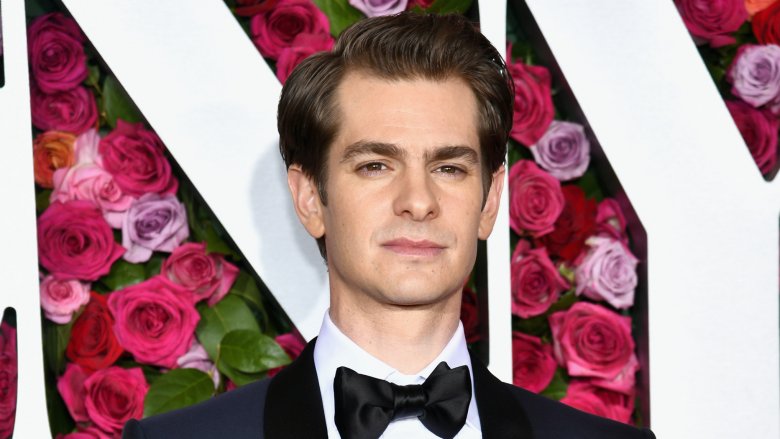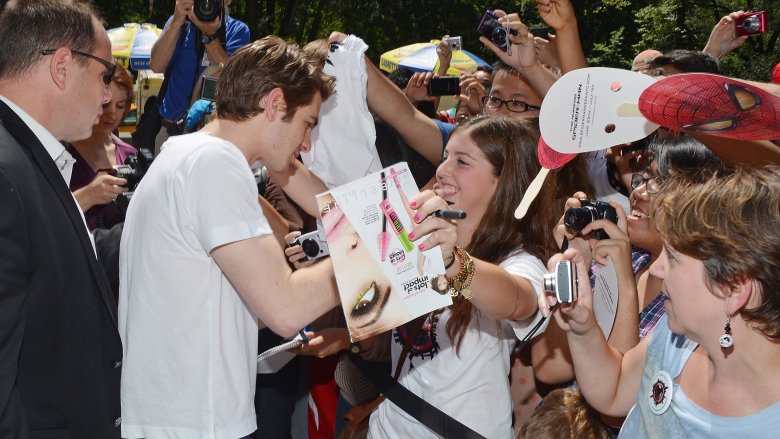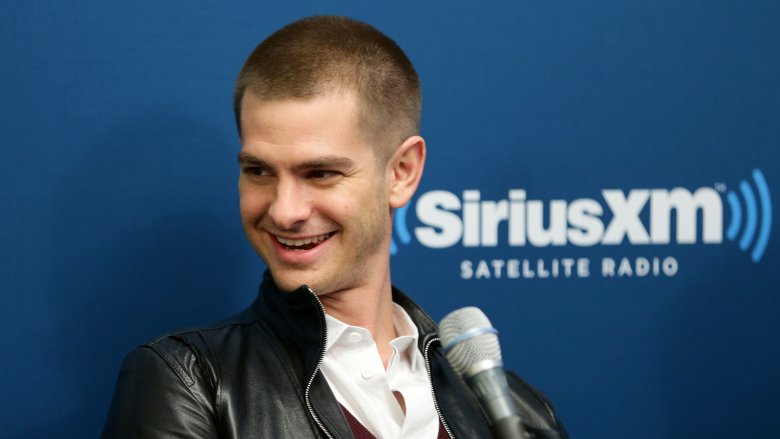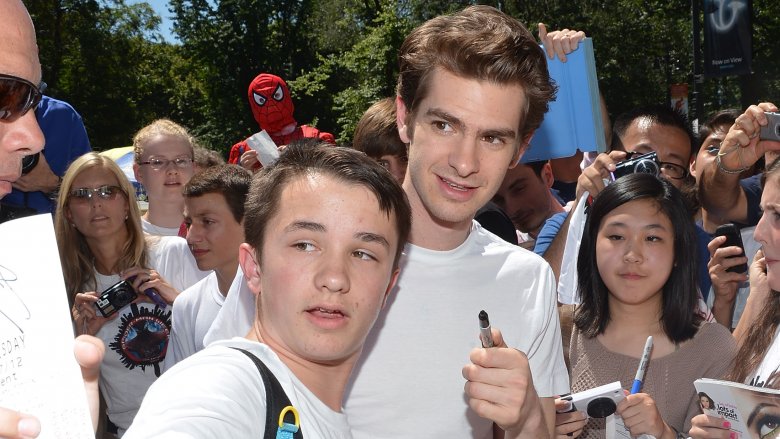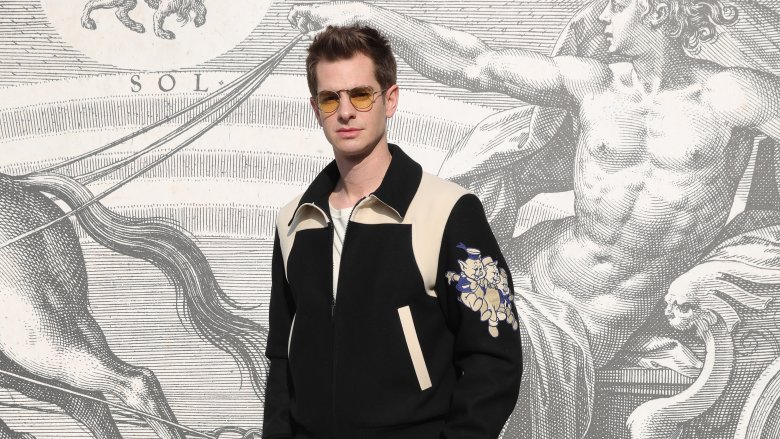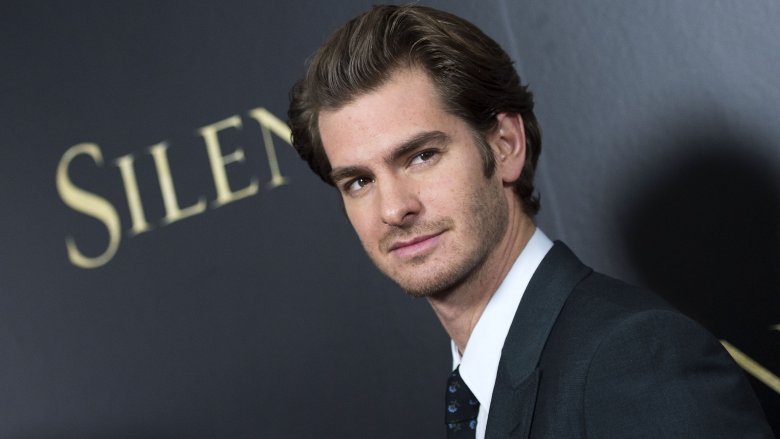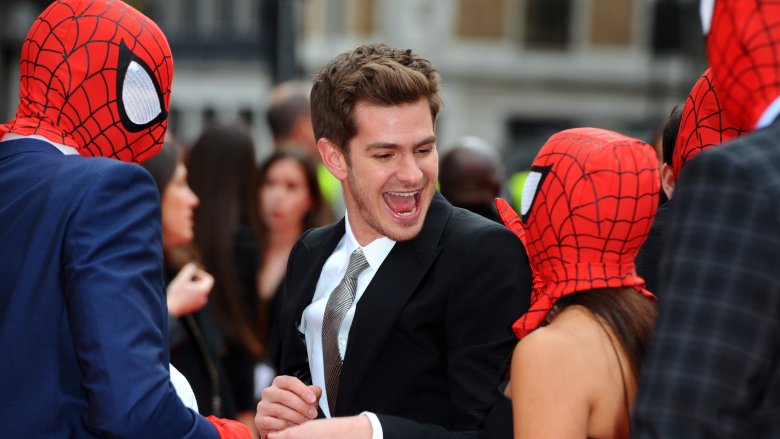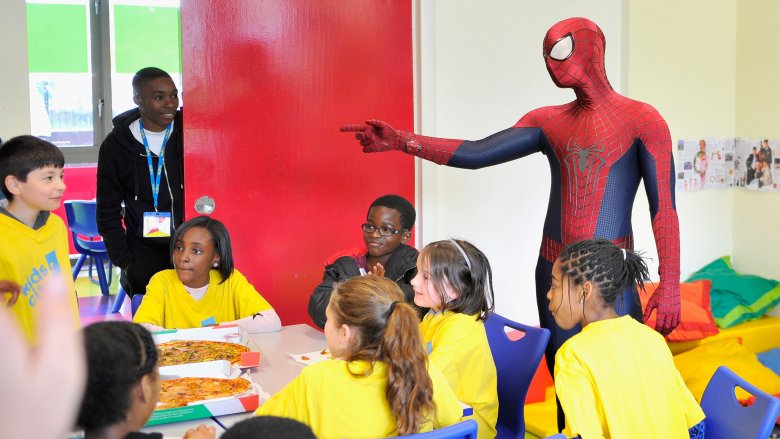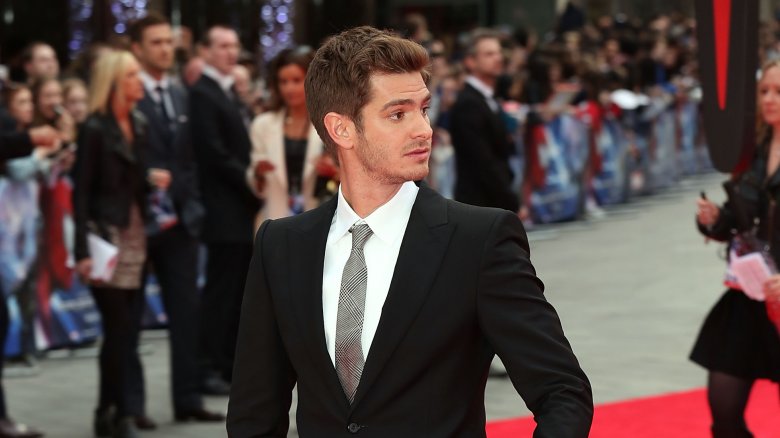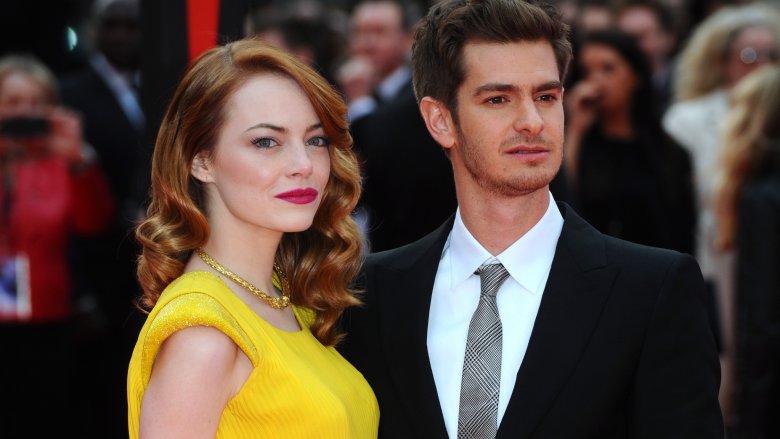The Real Reason Andrew Garfield Was Let Go From The Spider-Man Series
Anyone who gets to play Spider-Man is living a dream come true. How many children don the iconic mask and pretend to spray web-shooters at pets, claiming they're on their way to rescue their beloved Mary Jane? For a scant few actors, that dream becomes a dizzying reality, as it did for Andrew Garfield. As star of The Amazing Spider-Man and The Amazing Spider-Man 2, he brought Peter Parker to moody, wall-crawling life, battling classic villains like the Lizard and Electro as he romanced Gwen Stacy.
Alas, the dream was brief. Nowadays, only a few years later, our Spider-Man is played by Tom Holland as a denizen of the Marvel Cinematic Universe, a shy high-schooler devoted to protecting his Queens neighborhood when he isn't grabbing a bite at the bodega. How, exactly, did this happen? Couldn't Garfield have made the jump to the MCU? Weren't his movies roundly successful? Didn't everyone agree that he and Stone positively crackled on screen? The answer, as always, is complicated. Join us as we explore exactly why Garfield's time in the spidery spotlight ended in 2014.
Box office slippage
It's easy to forget that The Amazing Spider-Man did very well, commercially speaking. Raking in a juicy $757 million gross worldwide, it finished as the seventh highest-grossing movie of 2012. If that doesn't impress you, recall that this means it did better than two Disney juggernauts (Brave and Wreck-It Ralph), The Hunger Games, and Les Miserables. It even put up a decent fight against The Avengers and The Dark Knight Rises, unquestionably two of the most highly-anticipated movies of the decade. For a while, Andrew Garfield's Peter Parker was swinging with the best of them.
Then came The Amazing Spider-Man 2. Now, a worldwide gross of $709 million isn't anything to sneeze at, but when you compare how it fared against other 2014 releases, the slippage is obvious. Amazing 2 was the ninth most profitable film of 2014, and far less critically successful than its predecessor. Most damning is the fact that it was soundly outstripped by its direct competitors. Captain America: The Winter Soldier, Guardians of the Galaxy, and X-Men: Days of Future Past all finished higher than Amazing 2, as did installments in other action blockbuster franchises like Transformers and The Hunger Games. Garfield's Spider-Man was on a downward trend, and against superhero films on the rise, even a tumble just a couple of spots down the charts was unforgivable.
He failed to show up for a crucial appearance
Showing up makes a difference, even at the most mundane sort of desk job. Showing up when you're an international movie star? That's basically your whole career. The massive leak of Sony emails that flooded the internet in 2015 revealed that, in the minds of some executives, Garfield failed this all-important test when he failed to appear at an event in Rio de Janeiro, where The Amazing Spider-Man 3 was set to be announced for a 2016 release.
"Here we are about one hour away from our Gala event and Andrew decides he doesn't want to attend. He has a rather scruffy beard and he just wants to be left alone," an email from Sony chief Kaz Hirai read, after Garfield claimed jet lag-induced illness and failed to appear. Despite Garfield's rationale, his absence was taken as a snub and was reportedly a turning point for the company. Down went Spider-Man — and allegedly, Garfield's work with Sony as a whole.
Sony cut many of his favorite scenes
It's not all gala appearances and box office downturns when it comes to Garfield's brief tenure as Spider-Man. Artistically, he'd begun to feel unfulfilled — even actively worked against. Apparently, a number of scenes that were particularly character-centric were cut from the final version of The Amazing Spider-Man 2 — many of them the work Garfield was proudest of and most invested in. Not only did this cause a rift between him and the filmmakers on grounds of vision, it targeted his work specifically.
It's a conflict as old as superhero movies themselves: do you focus on the man in the suit and what makes him put it on in the first place, or do you prioritize the beat-'em-up action that audiences crave? There's no one right answer, formula, or concept — like any genre, it's a balancing act each team must figure out for themselves. In the case of the Amazing Spider-Man movies, however, one side of the scales was dramatically tipped.
He was naive to the ways of Hollywood
Hollywood is a machine of dreams, fed by the grist of hardship. To succeed as an actor, you need both thick skin and flexibility. Your expectations must be kept, somehow, simultaneously high and low, with a positively Herculean degree of persistence. Few make it all the way to red carpet. Fewer still stay there for long. Even after reaching the top of the proverbial heap, Garfield found himself felled by the realities of the film industry... and maintains that this one of the biggest reasons his tenure as Spider-Man didn't last.
"I thought, if I can infuse all this ancient knowledge and wisdom into [Spider-Man], it could be profoundly affecting for young people in the audience. That was always my intention and what I tried to do," he told The Guardian in 2016. "I was 25 and I was naive — not because of that, but because I was naive to the whole process of making one of those big-budget films." Garfield, in the end, didn't end up exactly where he likely thought he'd be. But what's clear from his remarks is that he absolutely gave the role of Spider-Man his all. In the end, that's all an actor can do.
He had a vision of the character he was unwilling to comprise
The best characters often come from actors with a concrete vision, who synthesize stories, experiences, and research into a coherent and multidimensional whole. Superhero stories often concentrate on this process — they are, going on a century after their creation, truly iconic tales that pull from high and low culture across the world. Garfield believed in the power of this process as fervently as a 25-year-old rookie could. "I'd been reading the mythologists Joseph Campbell and James Hillman," he said after the series' cancellation. "And when I took on Spider-Man, I thought, 'Holy s**t! This is exquisite and terrifying and incredible. I have been given the responsibility of reaching my hand out from the big screen and putting it on [young boys'] shoulders. That is a gift for me and a big burden to carry. And I'm so up for it.'"
Unfortunately, the studio didn't agree. The cutting of character-centric scenes, the promotion of Garfield as a celebrity, and the ultimate reality of The Amazing Spider-Man as a blockbuster series made Garfield's highfalutin ideas unsustainable, if still admirable. He has, at least, made piece with this rift: "What I'll proudly say is that I didn't compromise who I was, I was only ever myself."
He was interested in more high-profile work
Andrew Garfield is an actor's actor, and as we now understand, this played a role in the end of The Amazing Spider-Man. But beyond causing clashes between creative aims and budgetary concerns, it also likely played a role in pushing Garfield toward other directors. Ever since Tom Holland took up the webbed suit to flip and quip his way through the MCU's sprawling saga, Garfield has devoted himself almost entirely to cerebral and even arthouse cinema. 2016 saw him take part in Martin Scorsese's Silence, in which he played a 17th-century Jesuit priest. In 2017, he played a Polio survivor in the biopic Breathe. Most recently, he starred in Under the Silver Lake, a neo-noir that takes his character across Los Angeles in pursuit of conspiracy. If the end of Spider-Man pushed Garfield into this kind of work, its as much a blessing as it is a curse — and perhaps Garfield himself feels the same way.
His Peter Parker was a little too cool
Peter Parker is a consummate nerd. Let us never forget that in his debut in Amazing Fantasy #15, he is bitten by a radioactive spider because he is visiting a lab after school. Not for extra credit, and not because he works there. No, Peter Parker just loves science so dearly (and is so thoroughly rejected by the popular kids) that he likes to spend his time discussing the finer points of atomic energy. Christened "Midtown High's only professional wallflower" on the very first panel he ever appeared in, he is an inveterate geek before he is a superhero, a swinging bachelor, or the Daily Bugle's oft-abused shutterbug.
Sure, The Amazing Spider-Man movies inform us of Peter's nerdery. But it's very much a matter of being told rather than shown. Of the three actors who make up Spidey's screen presence, Garfield is the one whose handsome looks weren't toned down — they were, if anything, accentuated with mousse and wardrobe choices. He skateboards. He broods with a charisma that is entirely too cool. Maguire's Spidey loved to talk chemistry, and Holland's gets together with his best friend Ned to build LEGO models of the Death Star. But you can't really picture Garfield's Spider-Man doing much in the geek arena beyond maybe playing the occasional round of Mortal Kombat. He's just too cool, and when it comes to Spider-Man, that's a fatal flaw.
He had to compete with Marvel
The MCU debuted in 2008 with the explosive arrival of Robert Downey Jr.'s Tony Stark in Iron Man. By 2012, Marvel Studios had pulled its team together in The Avengers, a blockbuster event that would usher in what we might just one day call the "Marvel Age" of movies. Audiences were enthralled, shawarma chefs rejoiced, and superhero fans everywhere felt the dawn of a new sun on their beleaguered faces.
And, oh yeah, Spider-Man was there too. Of course, with Sony holding the movie rights to the character, he remained trapped in his own cinematic universe. Though Amazing Spider-Man did well at the box office, the fact remained that it was thoroughly eclipsed by the other Marvel-based movie to come out that year, and that the MCU was showing far more staying power than Sony's spider-flicks.
In retrospect, the writing was very much on the wall: people were falling for Marvel's sunny, quip-laden vision of their own universe far more than with Sony's slick take on the iconic webslinger. As the years went on, Marvel built up more and more gravity and Spider-Man, ever the company's flagship comic book hero, was pulled in, assimilated, and debuted as Tom Holland's lovable dweeb. There was an inevitability to this process even the best movie couldn't have thwarted... and unfortunately, Garfield's films were far from the best.
His Spidey came right after Tobey Maguire's
Director Sam Raimi's spin on Spider-Man feels like ancient history now. But try not to let memories of Tobey Maguire dancing in the jazz club cloud your mind just yet. Instead, remember Alfred Molina's trailblazing performance as a villain at war with himself. Remember Willem Dafoe's lunatic glee at being able to bombard New Yorkers with pumpkin-themed bombs. Remember Kirsten Dunst's warmhearted girl-next-door. Remember the upside-down kiss, and perhaps above all, remember that iconic train rescue. Remember how ardently the world loved these movies.
Only five years separate the last of the Maguire trilogy from the first of the Garfield duo. In some ways, that's a long time — it took under five years for Marvel to go from Iron Man being a surprise hit to The Avengers conquering the world. But it's not long enough for a generation to turn over. Kids who grew up with Maguire were barely into adulthood by the time Garfield rolled around, if they were adults yet at all. None had kids of their own. Maguire remained an A-list star, rather than an elder statesman passing down a beloved role. It was too soon for anyone to erase the mark left by the first trilogy from their minds, too soon for there to be an organic desire for a new take on an old favorite. And in the end, that's the tenet a superhero flick lives and dies by.
He only had chemistry with Emma Stone
If there's one indisputable high point of the Amazing Spider-Man movies, it's the romance between Peter Parker and Gwen Stacy. Andrew Garfield and Emma Stone had a lot to overcome in making their star-crossed lovers work — Mary Jane Watson is likely the most famous of Peter's love interests, and everyone goes into a Gwen Stacy story knowing how it will end. Despite all of this, Stone and Garfield had a chemistry no fan or critic could deny. As Rolling Stone put it upon the film's release, their young love is the core of the movie.
Sadly, Garfield's sizzle tends to fizzle when directed towards anyone but Stone. Spider-Man's rogues gallery is one the best around precisely because of Peter's relationships to them: characters like the Lizard, the first Amazing Spider-Man movie's villain, are intended as dark mirrors of our hero's obsessive tendencies. Yet that relationship never truly developed on screen. Nor did Peter's connection to his dear Aunt May, or his bully, Flash Thompson, or even his deceased parents, meant to serve as a driving mystery of this run of films. We don't feel Peter's anguish at lying to loved ones, the acidic resentment stoked by Midtown High's rabble of jocks. Every moment of true emotion is reserved for Gwen. And while that's a wonderful part of the story, it's only one piece in the complex puzzle that makes up a successful spin on Spider-Man.
